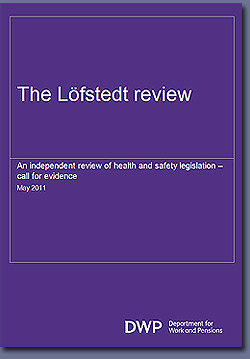 |
 |
|
CWU NW Regional Health And Safety Forum Responds To H&S Review With a closing date of 29th July, the Löfstedt Review of health and safety legislation call for evidence, was closed last week.
Below are details of the forum’s response: Question 1: Are there any particular health and safety regulations (or ACoPs) that have significantly improved health and safety and should not be changed? Whilst outside the remit of this consolation and merely for an example – the The Regulatory Reform (Fire Safety) Order 2005 came into effect in October 2006 replacing over 70 pieces of fire safety law and has simplified legislative requirements. Question 8: Are there any lessons that can be learned from the way other EU countries have approached the regulation of health and safety, in terms of (a) their overall approach and (b) regulating for particular risks or hazards? Comparisons between the UK’s health and safety system and health and safety organisation in the rest of the EU whilst interesting would be only be beneficial to British industry if we are to raise our standards to be the leaders – not look for the lowest common denominator. The lower financial costs to business, the short and long term costs to the NHS and the moral costs to the workers should all be in the equation. Question 9: Can you provide evidence that the requirements of EU Directives have or have not been unnecessarily enhanced (‘gold-plated’) when incorporated into UK health and safety regulation? We have seen no evidence to change our opinion that ‘gold-plating' is endemic on UK Health and Safety legislation and consequently conclude that it is a myth. Question 10: Does health and safety law suitably place responsibility in an appropriate way on those that create risk? If not what changes would be required? Similar to previously mentioned RRO (fire) 2005 has led to prosecutions preventing death/injury. The risk to worker/society should be prosecuted waiting for an incident or following a workplace injury.
Any other comments/evidence? The business community, with the exception of a few excellent companies, despite years and major attempts by the HSE to educate them; knows little about the implementation of health and safety in the workplace, nor does it understand much of the legislation. The misinterpretation, whether intentional or by ignorance, of current legislation has often led to a belt and braces approach which has allowed British media to crate the “elf-and-safety” mythical beast. We would fundamentally dispute that employers are burdened with Health and safety regulations. As previously mentioned there are less now than 30 years ago. They are not “over enforced” as many companies will generally have an inspection only once in 38 years unless they have a major incident or are involved with significant hazards. Only one in thirteen major injuries is even investigated. We would further argue that cuts in resourcing the HSE need to be reversed. Without the [even remote] possibility of a proactive inspection, unscrupulous employers will play fast and loose with health & safety and undercut those many excellent employers who respect legislation, their employees and society in general. You can also download the Löfstedt Review Document from the E-Library and input search words: 'Lofstedt Review' Source: CWU NW H&S Forum
|
 Derek Maylor, Secretary to the CWU’s North West Health & Safety Forum responded on behalf of the forum to various questions asked in the call to evidence document.
Derek Maylor, Secretary to the CWU’s North West Health & Safety Forum responded on behalf of the forum to various questions asked in the call to evidence document.